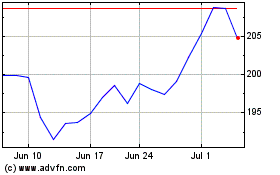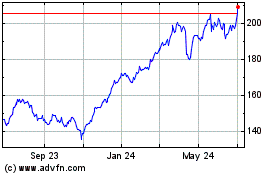By Emily Glazer, Christopher M. Matthews and Aruna Viswanatha
J.P. Morgan Chase & Co. is expected to pay around $200
million to settle federal investigations into whether it tried to
win business by hiring the sons and daughters of powerful people in
Asia, people familiar with the matter said.
The settlement is expected in the coming months and would
resolve criminal and civil matters under a foreign bribery probe
that has dogged the bank for years. J.P. Morgan likely would admit
that its hiring practices violated U.S. law but wouldn't be charged
criminally, the people said.
While the terms are in the late stages of negotiation, a deal
could fall apart or change in coming weeks, the people said.
A resolution to the J.P. Morgan investigation would be the first
among the wide-ranging probes into Wall Street banks' hiring of
"princelings," the kin of high-ranking Chinese government officials
and managers of state-owned companies, allegedly to curry favor in
getting deals. The settlement could pave the way for similar
outcomes in ongoing inquiries into other banks, people familiar
with the cases have said.
The Wall Street Journal has previously reported that J.P. Morgan
hired the children of several powerful Chinese government officials
who appeared to be unqualified for their positions and kept some on
despite poor job performance. In one email, a bank executive
discussed how to "handle the son in NY and leverage the father in
China."
One of the hires, Gao Jue, is the son of China's current
commerce minister, Gao Hucheng. Gao Jue did poorly on his job
interviews at J.P. Morgan, messed up his work visa, accidentally
sent a sexually explicit email to a human-resources employee and
was described by a senior banker as "immature, irresponsible and
unreliable," according to internal bank emails reviewed by the
Journal and people familiar with the matter. J.P. Morgan's decision
to hire Mr. Gao was widely understood within the bank to have been
supported by William Daley, a senior executive at the time and
former U.S. commerce secretary and White House chief of staff,
according to the internal bank emails.
Mr. Daley declined to comment. At the time of the page-one Wall
Street Journal article, Gao Jue declined to comment through his
then-employer, Goldman Sachs Group Inc. His father, Gao Hucheng,
didn't respond to questions sent to the Ministry of Commerce.
The Journal also previously reported that the head of Hong
Kong's stock exchange, Charles Li, also was involved in
controversial hiring efforts when he worked at J.P. Morgan several
years ago, citing people familiar with the matter and emails
reviewed by the Journal. Mr. Li sponsored a large number of
referrals, including a family friend of Huang Hongyuan, then a
senior official at the China Securities Regulatory Commission and
now the president of the Shanghai Stock Exchange, according to an
internal spreadsheet that tallied his hires.
Mr. Li said in a 2015 statement to the Journal that internships
and referral hires were made based on credentials and feedback from
multiple sources, were screened by the firm's lawyers and
compliance staff, and that he alone couldn't decide to hire a
candidate.
In all, J.P. Morgan hired 222 candidates under a program known
internally as "Sons and Daughters" that ran from 2004 to 2013. They
included those referred by officials at nine of 12 large Chinese
companies that the bank took public in Hong Kong.
The U.S. Foreign Corrupt Practices Act sets potential heavy
penalties for companies that use financial inducements to win
business from public officials. The J.P. Morgan probe has been
watched closely in part because it is one of the first major
investigations into Wall Street under FCPA and because the
government has pushed its enforcement of the law into grayer areas
such as hiring practices from more direct forms of bribery.
The probe into the New York bank has lasted more than three
years. J.P. Morgan's lawyers along with others at large U.S. and
European banks have accused the government of overreaching in the
hiring cases by threatening to criminalize standard business
practices in some countries, people close to the firms said.
Both sides have agreed that an executive of a state-owned
company is considered a government official, but there is dispute
over what conduct is considered corrupt from a legal point of view
in cultures where it is common to hire well-connected individuals.
U.S. government officials have told the banks that hiring someone
with connections to a government official with the intent of
winning business is, in itself, a violation of law even if there
isn't an explicit quid pro quo, the people said.
Prosecutors have privately conceded, however, that a criminal
case would be difficult to prove in situations like the princeling
hirings. In the J.P. Morgan example, they have faced difficulty
proving a quid pro quo in which banks' princeling internships led
to revenue-producing assignments, people close to the case
said.
Under the settlement being discussed, J.P. Morgan would pay a
big fine but likely avoid more costly penalties. The bank is likely
to enter into a nonprosecution agreement, some of the people said,
whereby it admits to wrongdoing and agrees to make changes but
avoids criminal charges.
The expected pact would resolve investigations by the Justice
Department, U.S. Attorney's Office for the Eastern District of New
York and Securities and Exchange Commission.
The settlement timing has been unclear for months, but people
close to the case said the coming presidential election and
prosecutors' fiscal year-end of Sept. 30 may be pushing the process
along. The bank's lawyers have been meeting regularly for more than
a year with prosecutors at the U.S. attorney's office in Brooklyn,
people familiar with the case have said.
Many of J.P. Morgan's senior executives in Asia left as the bank
investigated the hiring. It isn't clear whether any people could
face civil or criminal charges.
Other banks under scrutiny include Citigroup Inc., Credit Suisse
Group AG, Deutsche Bank one of the first enforcement actionsAG,
Goldman Sachs Group Inc.,HSBC Holdings PLC, Morgan Stanley and UBS
Group AG, according to regulatory filings. Representatives of the
banks declined to comment.
Bank of New York Mellon Corp. in August 2015 agreed to pay $14.8
million to settle civil charges in a FCPA case about giving
internships to relatives of officials from a Middle Eastern
sovereign-wealth fund. The pact, in which the firm didn't admit or
deny wrongdoing, was one of the first enforcement actions brought
by the SEC against a financial institution under the FCPA.
Write to Emily Glazer at emily.glazer@wsj.com, Christopher M.
Matthews at christopher.matthews@wsj.com and Aruna Viswanatha at
Aruna.Viswanatha@wsj.com
(END) Dow Jones Newswires
July 22, 2016 02:47 ET (06:47 GMT)
Copyright (c) 2016 Dow Jones & Company, Inc.
JP Morgan Chase (NYSE:JPM)
Historical Stock Chart
From Mar 2024 to Apr 2024

JP Morgan Chase (NYSE:JPM)
Historical Stock Chart
From Apr 2023 to Apr 2024
